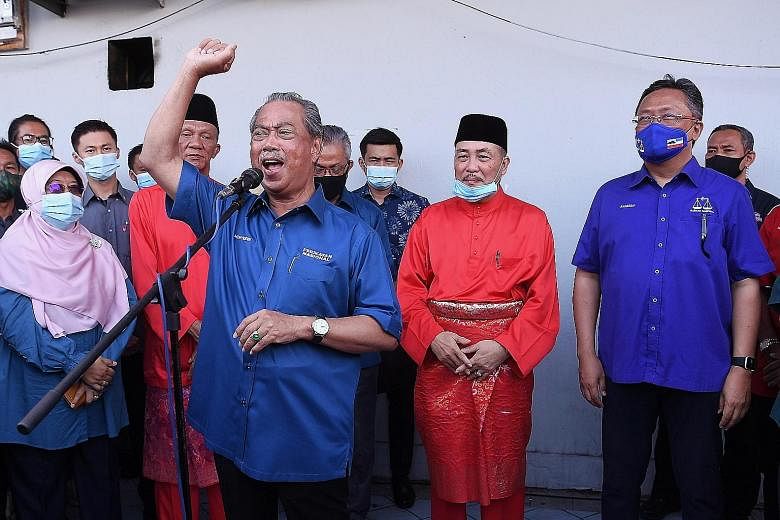Malaysian Prime Minister Muhyiddin Yassin's 11th-hour intervention has failed to untangle overlapping claims for seats among his allies in the Sabah state polls, raising questions about the unity within his Perikatan Nasional (PN) government.
Yesterday, which was Nomination Day for the Sept 26 polls, the Premier announced a so-called alliance, dubbed Gabungan Rakyat Sabah, of the three factions in the state aligned to him. Yet, after nominations closed, they clashed in 17 of the 73 seats up for grabs, hurting their chances of toppling the Parti Warisan Sabah-led administration.
This could portend future disagreements - between the parties who have formally signed up to PN, the Umno-led Barisan Nasional (BN) and smaller parties which support the Premier - when a general election, which is expected within months, is held.
"This is a sneak peek to what will happen at the general election. Previous prime ministers were leaders of a single ruling pact, BN. But now previous arrangements or seat allocations have collapsed," risk consultancy BowerGroupAsia's director Adib Zalkapli told The Sunday Times.
After the shock end of Umno's six-decade rule in 2018, most BN parties left the coalition, but later re-grouped under Parti Pribumi Bersatu Malaysia (Bersatu) president Muhyiddin's leadership when defections toppled the previous Pakatan Harapan (PH) government in Kuala Lumpur in February.
The parties that form the federal government are now grouped under at least four separate umbrellas.
Accommodating Bersatu - which wants to be a major national party given that its leader, whether the ousted Tun Dr Mahathir Mohamad or Tan Sri Muhyiddin, had been prime minister for the past two years - means other parties will have to accept fewer seats, which they seem reticent to do.
Former BN component Parti Bersatu Sabah (PBS) - which led the state government from 1985 to 1994 - has decided to contest now under its own banner despite both BN and PN coaxing it to use their logos.
"There is a strong anti-Malaya sentiment as Sabahans want more autonomy," a top PBS official told The Sunday Times.
"So, strategically, we are using our own flag, and if we win most of the 22 seats we contest, why shouldn't we stake a claim to the chief ministership instead of Umno or Bersatu?"
One top Sabah PN leader told The Sunday Times that "the problem now is we have three separate bodies unilaterally issuing credentials for candidates instead of before, when there was only one candidate flying the BN flag in any constituency".
The Premier flew into Sabah early on Friday and a planned quick breakfast with party leaders turned into a nearly two-hour showdown that failed to find a solution to the 11 overlapping contests at the time.
Umno president Ahmad Zahid Hamidi said after the meeting that all parties had reached a consensus to avoid clashes which would split support. But even after a late-night meeting, most stuck to their guns on Nomination Day, leading to a rare occurrence in Malaysia, where members of the federal government find themselves battling their own allies at an election.
After nominations closed, Mr Muhyiddin said: "What is important is that we will work as a team to form a government that will develop Sabah.
"Members at all levels must put aside all disagreements and old grudges to embrace a new spirit of Gabungan Rakyat Sabah. No single party can form the government."
But the suggestion in his speech that Bersatu's Sabah chief Hajiji Noor be made chief minister was immediately rebuffed by Umno, which insisted a decision would be made only after results were known.
Given Umno's reticence to join PN, all indications are that the Sabah impasse among parties in the pact will be repeated at the next general election.
Umno and Parti Islam SeMalaysia, another key member of PN, have been agitating for fresh elections to end the instability stemming from the government's slim 113 to 109 majority in Parliament.
But with 222 parliamentary and nearly 500 state assembly seats up for grabs, it will be far more difficult to resolve than the intractable quibbling over the 73-strong Sabah legislative chamber.

